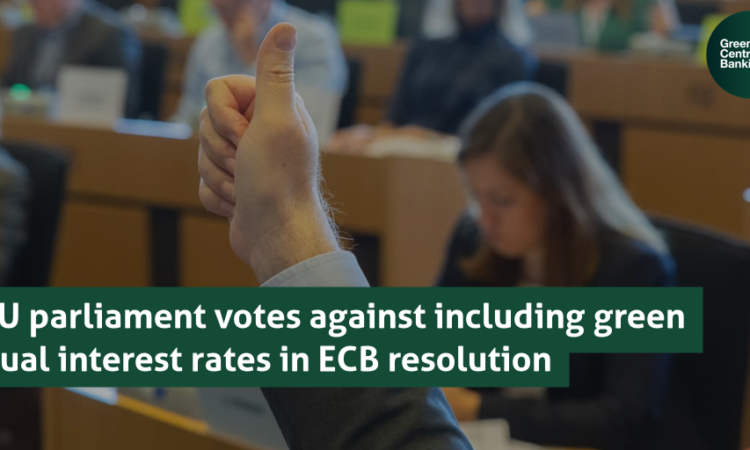
The EU parliament adopted its annual resolution on the European Central Bank (ECB) on Tuesday but failed to pass a series of amendments meant to provide more support for a green transition, including supporting green dual interest rates. While the resolution is not legally binding, the ECB does respond to the text in its annual report.
The resolution – with 418 votes in favour, 157 against and 42 abstentions – did not include initial text on the need to align the ECB’s policies with the Paris Agreement. An amendment aimed at exploring lowering interest rates for some green investments was also dismissed, despite the concept of green dual interest rates being supported by ECB board members and French president Emmanual Macron.
“We missed a crucial chance to accelerate the green transition,” said Katarzyna Hanula-Bobbitt, head of policy at Positive Money. “Greening monetary policy, especially by implementing dual interest rates, could be a smart solution already at our disposal for the green sector, a strategy that could bolster green investments and help counter future inflationary pressures”.
The resolution does include a reminder that the ECB’s secondary mandate is to support the general EU economic policies, including a green transition, and notes that the central bank “as an EU institution, acting within its mandate, is bound by the EU’s commitments under the Paris Agreement”. It also asks the central bank “to assess the extent to which climate change potentially affects its ability to maintain price stability”.
The resolution also asks the ECB to continue its work on climate risk stress tests, and notes that the ECB’s climate roadmap “does not include targeted longer-term green refinancing operations or similar instruments”.
The resolution also urges the ECB to “investigate and swiftly address any suspicion of ideological bias”, alluding to a report from Politico that ECB board member Frank Elderson said at an internal meeting that staff members who did not align with the central bank’s green policies were not welcome.
Hanula-Bobbitt said the amendment was frustrating as it questions the independence of the central bank and is “politicising what should not be politicised”. It contradicts other points made in the resolution about price stability and inflation, which will only continue as climate change gets worse, she added.
The amendment is a potential precursor of what could come if results from the upcoming EU elections steer more centre-right and there is a “real threat” that there could be pushback against green policies, Hanula-Bobbitt said.
“The threat is that we’re going to move towards parties that are not so open towards climate and do not have climate as their priority,” she said.
This page was last updated February 28, 2024





